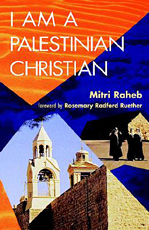Mitri Raheb is pastor of the Evangelical Lutheran Church in Bethlehem, where his family has lived for hundreds of years. He holds a doctorate from Marburg University in Germany. In her foreword to this paperback, theologian Rosemary Radford Ruether writes:
"Palestinian Christians today stand between a secular nationalism that has proven inadequate to the demands of justice and reconciliation between peoples, and Muslim and Jewish Zionist fundamentalisms that offer them no hope but only the threat of further oppression as a minority religious community in dominant Jewish or Islamic states."
The chapters in this book had their origin in lectures and sermons delivered at local and international conferences. According to Raheb, Palestine was blessed by God as a fertile land but fought over and torn apart by human beings. Five powers have ruled the country in this century alone. He discusses the tide of Palestinian Christians leaving the country, the Intifada as a cry for justice, the Israeli occupation as a system of injustice, and an agenda for Christian Arab Theology in the Twenty-First Century. In the last, Raheb writes:
"For us Christians, the Incarnation plays an important role in better defining a human being. God became human in Christ and thereby gave divine significance to all human life. That is why racism, fascism, and religious fanaticism are alien to every true religion. Since the Incarnation one can no longer use religion against human beings or pit God against human beings. It must obviously also be impossible since the Incarnation to wound, discriminate against, or even make war against human beings in the name of God. If a human being is wounded, then God is wounded also. If a human being is honored, God is too. Whoever loves God also loves the 'brother or sister' (I John 4: 19-21). To be religious, therefore, means simply to be a true human being."
In series of fascinating essays, Raheb presents his interpretations of biblical ideas including Israel as God's elect people, the promise of land, the Exodus from Egypt, the story of Jonah and Nineveh, and the parable of the Good Samaritan. In each of these pieces, the author reveals the complications of these teachings in relationship to the tensions, fears, and struggles of Palestinian Christians. In the last essay titled, "I Have A Dream," Raheb outlines his hopes for peace and justice in his homeland and in the Middle East.
